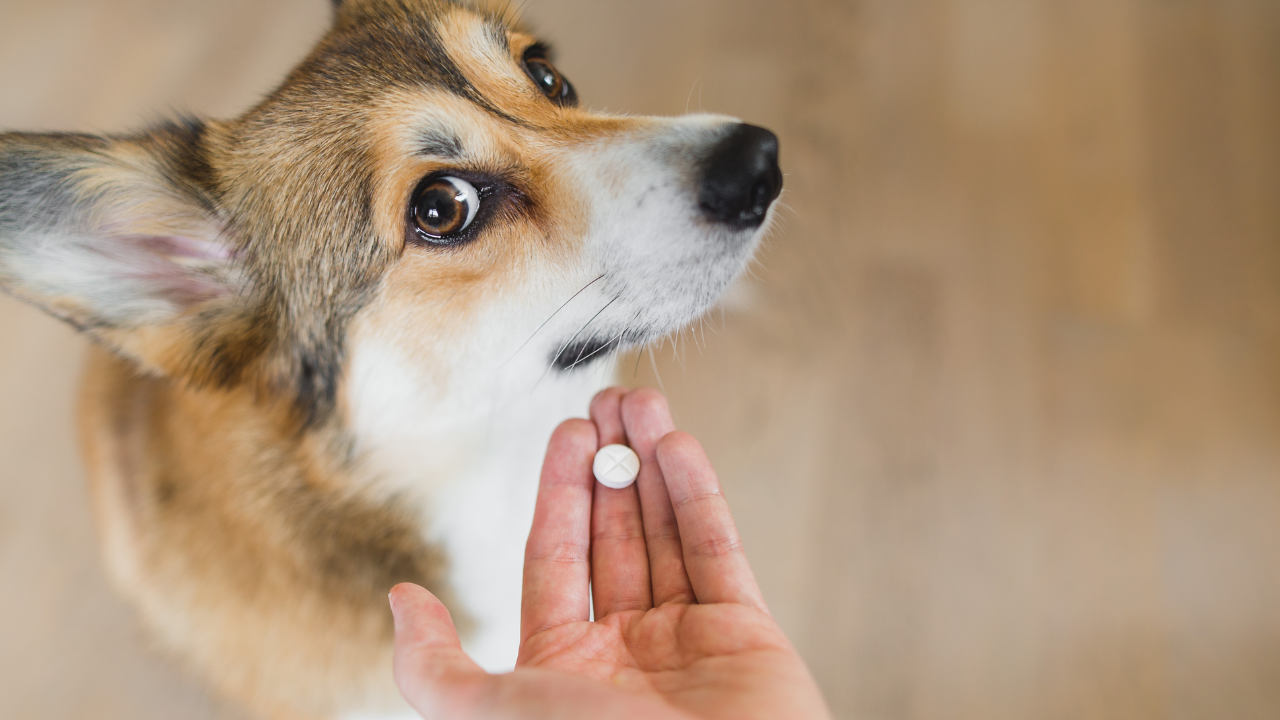
Canine acute diarrhea is a common health issue that dog owners can often face. In the past, dogs' go-to treatment for diarrhea was the antibiotic metronidazole, also known as Flagyl.
More recently, metronidazole as a treatment for acute diarrhea in dogs has several drawbacks, including negative effects on the dog's microbiome, which can extend for many months. Its overuse has contributed to the development of antibiotic resistance.
With the holiday season approaching, when pets are more likely to be fed treats and leftovers that can cause diarrhea, it is important to explore alternative treatments for canine acute diarrhea.
This blog post aims to discuss effective alternatives to metronidazole and provide practical tips for treating diarrhea in dogs during the festive season, or any season for that matter!
What does metronidazole treat for dogs?
- acute diarrhea from dietary indiscretion, but current recommendations are to NOT give it for this indication!
- Giardia infections
- Clostridium perfringens infections
- Inflammatory bowel disease or IBD
- anaerobic bacterial infections
How fast does metronidazole stop diarrhea?
There is no concrete evidence that metronidazole stops diarrhea any faster than a conservative approach to management. We need to stop using it for diarrhea as it will not work when we need it.
Understanding the Impact of Metronidazole:

Metronidazole is an antibiotic commonly used to treat diarrhea in dogs. However, studies have shown that this medication can disrupt the balance of beneficial bacteria in the dog's gut, leading to dysbiosis. The adverse effects on the microbiome can persist for months, weakening the dog's overall digestive health.
A study published in the Journal of Veterinary Internal Medicine suggests that metronidazole can significantly alter the fecal microbiome in healthy dogs(1). This disruption can lead to dysbiosis, a condition where the balance of beneficial bacteria in the gut is disrupted, potentially causing long-term digestive health issues. Veterinary medicine is moving away from the overuse of metronidazole for dogs finally.
Antibiotic resistance

The overuse of antibiotics like metronidazole can also contribute to antibiotic resistance. This is a pressing global health issue, as it makes antibiotics less effective when they are genuinely needed. A systematic review in Clinical Microbiology and Infection identified consistent changes in the microbiota following the use of quinolones and metronidazole, underlining the potential for these drugs to contribute to antibiotic resistance.
We do not take antibiotics when we have acute diarrhea from food poisoning (our form of "dietary indiscretion") or a short course of diarrhea. We need to stop doing this for our pets unless it is medically necessary.
Metronidazole for dogs to treat giardia
Fenbendazole is recommended for giardia. High doses of metronidazole are needed to treat Giardia, and this could lead to neurological issues.
Reinfection can also occur more often than resistance, and higher doses are needed to treat Giardia, which could lead to neurological reactions.
Metronidazole toxicity and metronidazole overdose
Metronidazole toxicity in dogs can manifest in several ways, with signs ranging from vomiting to neurological complications (2). In more severe cases, dogs may exhibit difficulty walking, tremors, muscle spasms, disorientation, rapid eye movements, a head tilt, joint knuckling, or refusal to eat. Signs can happen with doses generally regarded as safe, but toxicity more often occurs with higher versus lower doses. Signs can develop in 9 to 12 days on a metronidazole dosage. Most dogs make a full recovery with gradual improvements when metronidazole is stopped with supportive care.
Neurological complications can also occur as metronidazole crosses the blood-brain barrier. Side effects dog metronidazole include peripheral neuropathy, dizziness, vertigo, and headache, with cerebellar toxicity being a particularly serious but rare condition.
While all dogs can potentially experience these side effects, individual sensitivity to metronidazole can vary, and some dogs may be more susceptible than others due to factors such as age, overall health status, and genetic predispositions.
Since the liver metabolizes metronidazole, it is important to adjust the dose for dogs with potential or known liver or kidney disease beforehand. They are at increased risk of metronidazole toxicity as they cannot eliminate it efficiently as their liver is compromised. Therefore, it's crucial for pet owners to monitor their dogs closely when administering this medication and to seek veterinary advice if any concerning symptoms arise.
Metronidazole overdose is rare in dogs as the pills themselves have a very bitter taste. If there is an overdose, it is because of human error usually.
What is the dosage of metronidazole for dogs?
Generally, no more than 20-30 mg/kg per day total (or 10-15 mg/kg twice daily), but a veterinarian should determine the dosage based on the clinical signs and diagnosis. These are general guidelines. Metronidazole should not be used to treat pregnant or nursing dogs, dogs with a sensitivity to it (this goes without saying), or dogs with liver disease.
Metronidazole for inflammatory bowel disease IBD and chronic diarrhea
Because metronidazole has an anti-inflammatory action, it has been used to treat inflammation in inflammatory bowel disease. Another antibiotic called tylosin is often used to treat inflammatory bowel disease as well.
Treat diarrhea: interventions that do not involve metronidazole treatment

Several studies have not shown an advantage of taking metronidazole over a conservative approach to diarrhea. One small study in 14 showed dogs treated with metronidazole recovered 1.5 days faster, and another more recent one from the Ohio State University showed dogs treated with metronidazole took longer to recover. A very large study showed no benefit at all to using metronidazole in dogs for acute diarrhea(3).
People go to the vet and expect a prescription drug when their dog is having diarrhea everywhere. Chances are that their dog has done this before, and they have a confirmation bias that it will resolve, as it had in the past when they gave dogs metronidazole. But the bottom line is that it would have more than likely been resolved without it.
Given the potential adverse effects of metronidazole on the gut microbiome and the issue of antibiotic resistance, and its questionable efficacy, it's crucial to explore alternative treatments for acute diarrhea in dogs. Here are some options:
Probiotics:
Probiotics can help restore the balance of gut bacteria and support healthy digestion. Although there is no solid evidence that probiotics help in cases of acute diarrhea, in theory, they can help alleviate diarrhea and bolster overall gut health. There is no one-size-fits-all approach to probiotics. Each pet will respond differently. Your veterinarian may have a recommendation for your pet's unique situation.
One study in cats showed that Lactobacillus acidophilus decreased Clostridium perfringens in stool. I mention this one as it is easily found at most health food stores (4).
Although yogurt is the source of probiotics, they are not in enough of a concentrated amount to make an impact in the case of acute diarrhea.
An easily found, inexpensive probiotic available at most pharmacies and health food stores is Culterelle. Mix 1/4 capsule in food twice daily for small dogs and cats. I have used 1/2 to 1 capsule in food twice daily for medium to large dogs.
Prebiotics:
Dogs with colitis may benefit from prebiotics such as slippery elm and psyllium. I like to use slippery elm in situations when there is small bowel diarrhea with large amounts of liquid diarrhea vs. large bowel diarrhea/colitis when there are smaller amounts of diarrhea with urgency and increased frequency.
Colitis symptoms include frequent bowel movements with urgency and sometimes even fresh blood. I will stop to say that any dog with blood in their stool should cause you to contact your veterinarian. These dogs could benefit more from psyllium over metronidazole.
If your dog is not dehydrated and with your veterinarian's input, you could consider adding psyllium to the food.
One tablespoon of Metamucil contains 4 grams of psyllium. Make sure you use the unflavored Metamucil or buy psyllium husk. Adjunctive treatment of idiopathic large bowel diarrhea dosing is 1,300 mg/kg given divided with meals in one day(2). This equates to 1 tsp per 5 pounds mixed in the food per day, or 1 Tbsp per your body weight of 20 pounds, approximately divided throughout the day over 2-3 meals.
Dogs with small bowel diarrhea (copious amounts) could be given some slippery elm. Here is a link to a blog post on how to use slippery elm in the case of diarrhea.

Nutritional Support:
A bland diet is best in the case of diarrhea. If the diarrhea is severe, it's a good idea to hold off on feeding until you can get a hold of your veterinarian. Err on the side of feeding smaller meals when things calm down, as the gut is not ready to digest food, and you are just fueling the fire.
Chicken Breast Diet: Start by boiling a skinless, boneless chicken breast in water until it's thoroughly cooked. Once it's cool enough to handle, shred the chicken into small, manageable pieces for your dog. In another pot, cook white rice until it's soft. Combine the chicken and rice in a 1:2 ratio, meaning twice as much rice as chicken. This bland diet should help soothe your dog's digestive and immune system, and firm up its stools.
Ground Beef Diet: Choose lean ground beef (90% lean or higher) to avoid excess fats which can exacerbate diarrhea. Cook the ground beef thoroughly in a pan, making sure to break it up into small pieces. Be sure to drain off any fat after cooking. Just like with the chicken recipe, cook some white rice until it's soft. Mix the ground beef and rice in a 1:2 ratio.
Cottage Cheese Diet: Cottage cheese is high in protein and calcium and can be easier for dogs to digest. For this option, you can mix 1 part cottage cheese with 2 parts boiled white rice. Make sure to use plain, unsalted cottage cheese and not a flavored variety.
Remember to let all meals cool down before serving them to your dog. Start by giving your dog smaller portions than usual, spread out over several meals throughout the day. If the diarrhea persists for more than 48 hours or if your dog seems unwell, consult with your veterinarian immediately.
Hydration:
Maintaining proper hydration is crucial for dogs with diarrhea. Offer plenty of fresh water to prevent dehydration. I keep bone broth on hand to encourage my pets to drink should they become ill. Should you purchase some at the store, make sure it does not have added salt, onions, or garlic.
Avoid giving our pet electrolyte water, opt for fresh water or clear unsalted broth if possible. Here is a link to a bone broth recipe.

Homeopathic Arsenicum album
Arsenicum album is particularly useful when the diarrhea is accompanied by restlessness, anxiety, and weakness, and when stools are watery, foul-smelling, or contain blood. Arsenicum album can also be an effective treatment in cases of gastrointestinal upset caused by consumption of rich or fatty foods. While it's generally considered safe for use in pets, the dosage should be tailored to the individual animal's needs. One common recommendation is to administer Arsenicum Album 30c every three hours to help form the stool and clear diarrhea.
It's crucial that you consult with a veterinarian or a homeopathic professional, especially when your pet is lethargic and with potentially debilitating and dehydrating diarrhea. Contact your veterinarian first, and do not delay treatment by waiting especially if your pet is not improving.
Natural Remedies versus OTC remedies
You should always check with your veterinarian if your dog has diarrhea regarding using any over the counter medications, as they can be problematic. Medications such as Immodium, Pepto bismol (especially in cats as it contains an aspirin derivative), or KaoPectate should not be given without consulting a veterinarian that they are appropriate for your pet's situation.
There are some remedies that I have on hand for my family and pets should anyone have an episode of diarrhea. One is the homeopathic remedy Aresenicum album, and the other is the herbal remedy Slippery Elm.
What if my dog's symptoms are not getting better?

- If your dog's diarrhea has persisted over 4 days
- Lethargy
- Fever
- Vomiting
- Blood in the stool
If your dog has not had a fecal analysis and they are frequenting the dog park, boarding facilities, or daycare, or is a poop eater, then make sure you check a fecal analysis.
Some veterinarians will allow you to drop off a sample to be checked. This should be done periodically anyway, depending on your dog's situation.
Preventing Diarrhea During the Holiday Season:
The holiday season can be a time of indulgence, with plenty of rich foods and treats. However, it's important to remember that the holidays can be a perfect storm of stress in the household and visitors, we should avoid indulging our pets in foods they are not accustomed to.
Instead of reaching for metrondizole in dogs for a speedy resolution of diarrhea that should resolve on its own we try other interventions instead.
Here are some tips to prevent diarrhea during the festive season:
Stick to a Regular Diet:
Maintain your pet's regular diet as much as possible during the holidays. Sudden dietary changes can trigger gastrointestinal issues, including diarrhea.

Avoid Feeding Table Scraps:
Many human foods can be toxic or difficult for dogs to digest, leading to gastrointestinal disturbances. There is something about the fat in turkey skin, gravies, and scraps that can really aggravate a dog's digestion. You should avoid giving these to your pets.
Provide Safe Treat Options:
Opt for safe and dog-friendly treats that have a track record of being well tolerated by your dog if you want to treat your pet during the holidays. Remember, access to veterinary care can be challenging and especially around the holidays when veterinary ER's are very busy, do you really want to spend it there?
Conclusion:
While metronidazole has long been a common treatment for canine acute diarrhea, recent studies have highlighted its potential negative effects on the gut microbiome and the risk of contributing to antibiotic resistance. However, by exploring alternative treatments and taking preventative measures during the holiday season, pet owners can effectively manage canine acute diarrhea without relying on antibiotics.
The health of our pets is always a priority, and understanding the latest research can guide us in making the best decisions for their wellbeing. Thankfully, many veterinarians are taking the time to explain why veterinary use of this medication for acute diarrhea has limited evidence for efficacy over the traditional methods of treatment, such as a bland diet and tincture of time.
References:
- J Vet Intern Med. September 2020;34(5):1853-1866 Effects of metronidazole on the fecal microbiome and metabolome in healthy dogs
- Dow SW, LeCouteur RA, Poss ML, Beadleston D. Central nervous system toxicosis associated with metronidazole treatment of dogs: five cases (1984-1987). J Am Vet Med Assoc. 1989;195(3):365-368.
-
Veterinary evidence Journal site on the Web RCVS Knowledge (Published since 2016) eISSN: 2396-9776; Quarterly
- Volume 6 | Issue 4 (December 2021)Baillon ML and Butterwick RF (2003). The efficacy of a probiotic strain, Lactobacillus acidophilus DSM 13241, in the recovery of cats from clinical Campylobacter infection, Proceedings of the 21st American College of Veterinary Internal Medicine Forum, Charlotte, North Carolina: 978.










